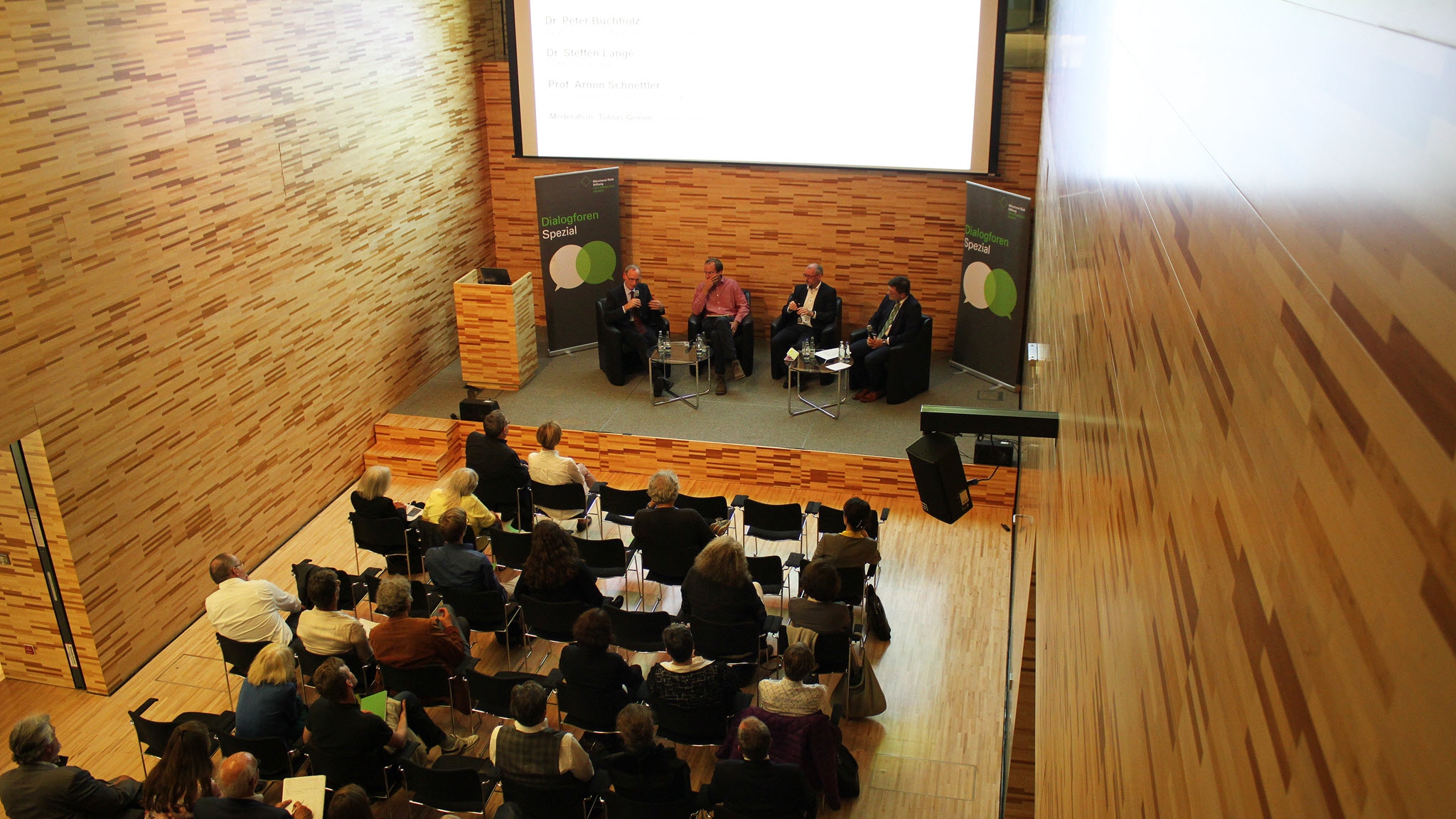
Energy turnaround and digitalisation - a step forward for climate protection, a step back in the fight for resources?
Dialogue Forum special as part of the "Münchener Klimaherbst" on 11 October 2018
properties.trackTitle
properties.trackSubtitle
The energy transition and digitalisation are seen as promising weapons in the fight against global warming. But there is no long-term security of supply for a range of raw materials such as raw earths, which are needed for digitalisation. And this raises the question of where, or under what conditions, these materials are extracted, and how great the environmental and social footprint from their production is.

At the Special Dialogue Forum organised by Munich Re Foundation as part of "Klimaherbst 2018", the experts considered the fight against climate change from a different perspective. Have the conditions even been met to restrict global warming to two degrees, never mind 1.5 degrees? The latter target would mean that we would need to reduce carbon emissions by 50% by 2030, and reduce them to zero by 2050. So there is good reason to be sceptical. Dr. Steffen Lange, from the Institute for Ecological Economy Research in Berlin, predicted that Germany will fail to meet its declared climate targets by 2020, and pointed out that the situation in other countries is no better. He said he would love to share the optimism regarding the success of the energy transition on a global level, but the plain facts argued against it succeeding. It would mean that 80% of the available coal reserves, one third of crude oil reserves, and half of all gas reserves would need to remain underground forever.
Bottleneck factor rare earths
A difficult undertaking: Industrialisation, which began over 200 years ago in the United Kingdom, will continue, and include countries like China, India and African states. And the process of industrialisation is always linked to high energy consumption. Dr. Peter Buchholz, Head of the German Mineral Resources Agency, DERA, argued that the physics and chemistry of energy production needed to change completely, and move away from the combustion of fossil fuel resources to wind and photovoltaic energy and hydropower. This transition would throw up entirely new problems. Buchholz explained that, for many of these raw materials that are needed for the energy transition, including rare earths, cobalt, indium and gallium, there is a higher market concentration for primary extraction than is the case for crude oil". He added that new trade conflicts could develop from this. Recycling was not a solution, he said, because recycling rates were much too low and costs too high.
There is also the question whether enough rare elements are actually available. According to a report from the World Bank, we will need ten times the amount that is consumed today to achieve the two-degree limit. Buchholz acknowledged that the stocks of certain raw materials are only calculated to last 10 years. But he said this did not mean they were definitively exhausted, because many reserves have not yet been discovered, and only a portion of the earth has been explored up to now. He concluded by saying that there were no perceived bottlenecks in terms of quantity alone that would restrict the progress of the energy transition. Instead, it was a question of cost and technical feasibility.

At the same time, key raw materials are found in South Africa, Russia and China. For that reason, he said that we needed to factor in political uncertainties in the supplier countries as well as the technical availability.
In addition, it would be between 10 and 20 years from today before a new mine could achieve the necessary scale for large-volume extraction. Buchholz therefore concluded that there were certain obstacles affecting the speed at which we can transition our energy systems. Lange added that we also needed to be aware of the conditions under which the raw materials are produced. As well as availability, there was also the question of the environmental and social impact of extracting the raw materials.
Decarbonisation, decentralisation and digitalisation
The switch to regenerative energies is one challenge. The other is providing lines and storage to ensure the electricity is available just where it is needed. Professor Armin Schnettler outlined the problem: "In the past, electricity production followed consumption, but today there is often spatial separation between production and consumption." The Senior Vice-President Research in Energy and Electronics at Siemens Corporate Technology believes that a key task will be integrating ever-greater fluctuations in renewable energies into the power system. This will only be possible with flexible load management, further expansion of the network, and large-scale storage of energy. His vision for the future encompasses the 3Ds of decarbonisation, decentralisation and digitalisation. But storage facilities and sector coupling – in other words closer networking between the energy sector and industry – will increase the complexity of the system. There are already days when Germany generates more regenerative electricity then it can consume. So we need to consider practical ways of storing this surplus energy.
"Power to X", whereby electricity is converted into various energy sources (power to gas, power to heat and power to fuel) could be one way to do this. Schnettler is convinced that we will have a hydrogen economy in one form or another. "In some of the world's sunniest regions, such as Chile, Africa, Australia or the Middle East, the production costs for electricity are already two cents per kilowatt hour or less, which means that power to X technology is already profitable. In future, we will have reconversion to gas power plants both in Germany and worldwide."
Reduce carbon emissions through closer networking
At the same time, profitability and efficiency should not be sacrificed. That applies equally for the envisaged digitalisation of industry, where for example, traffic jams on the roads will be eliminated through smart networking. "There are similar ideas for the agricultural and industrial sectors, and many calculations suggest that there is a greater savings potential here than there is from climate policy at international level," said environmental economist Lange. But resources are required to exploit this potential, and develop control units, sensors, computer centres and network infrastructure. "This means firstly consumption of resources and energy." If the internet was a country, it would be in third place behind the USA and China for power consumption. Over the next few years, demand for energy will rise significantly along with the increasing flood of data.
There is also the problem of what is known as rebound effects. The more efficient production and consumption becomes, the more time, money and resources are available, which can then be used for additional consumption. This could partly undo the successes of digitalisation. For this reason, Lange argues for the concept of digital sufficiency or frugality: as many digital devices and as much networking as necessary, but at the same time as few as possible. "Or instead of flying around the world for two days on a business trip, try video conferencing instead," the expert recommended.
Question favoured behaviour
The energy transition will not work if it is ordained from above. It needs to build on market mechanisms, be implemented on a global scale, and meet with sufficient acceptance among the general population. This is not to say that Germany should not forge ahead, as it did with renewable energies at the start of the new millennium. However, innovative technological developments today are more likely in China, as the example of e-mobility illustrates. Lange stressed that, ultimately, the battle against climate change involves more than just the technical aspects. He said we needed to expand our perspective and change favoured patterns of behaviour with the help of relevant incentive structures – for example with regard to nutrition (eating meat!).
We need to realise that the energy transition is not a short-term process, and that we will remain reliant for many decades on coal, oil and natural gas. But it is a promising sign that renewable energies are covering an ever-greater portion of consumption. And digitalisation too – provided it is properly used – will open up opportunities that will pave the way to more sustainable use of energy by humanity.
25 October 2018